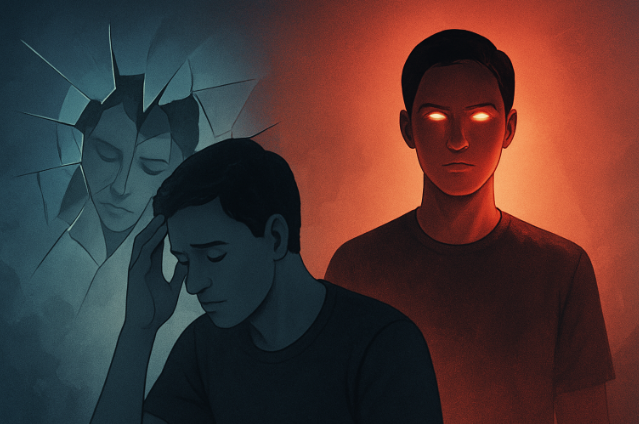
Most people live with some form of mental disorder without realising it, because mental health is still not prioritised the way physical health is. Many believe these conditions only exist within hospital walls, affecting patients who are far removed from daily life. The truth, however, is more unsettling. Countless people walk among us with symptoms they never recognise.
One such condition is schizophrenia. It often begins quietly. It is not always loud or obvious—sometimes it hides behind smiles, vacant stares, or comments that seem harmless, until suddenly, they are not. Recognising the signs early—before false clarity sets in—can mean the difference between recovery and losing someone to a world that only they can see.
What does schizophrenia feel like? You may think people are watching you more than usual, or that conversations carry secret meanings just for you. Patterns might begin to stand out everywhere—in TV shows, street signs, random numbers—as if they are trying to send you a hidden message. Sometimes you hear a faint voice calling your name when no one is there. Sometimes you feel someone behind you even when you are alone. At first, these moments come and go, and you may be able to dismiss them. But slowly they grow stronger, shaping your reality.
The most alarming stage is when these scattered feelings suddenly click together into what seems like a perfect picture. In that moment, a person may whisper chilling words: “Now everything makes sense.” To them, it feels like solving a puzzle they have been working on their whole life. To psychiatric professionals, it is a red line—a warning sign that the person has crossed into full-blown delusion.
At this stage, they may believe they have been chosen for a divine purpose, that the world is conspiring against them, or that they have unlocked a universal truth. These beliefs feel so real that no amount of reasoning or evidence can break them. This is not true clarity—it is a trap that feels like liberation.
From here, behaviour becomes unpredictable. Some withdraw, convinced they must hide their “truth.” Others grow restless or even aggressive, determined to act on their discovery. The rules of ordinary life no longer apply in their mind. The most frightening part is how invisible this shift can be until it fully takes hold. A friend, a colleague, or a family member might seem only a little distracted one day—and the next, they have crossed an invisible line.
“Now Everything Makes Sense”
In daily life, the phrase sounds harmless. We say it when we finally get a joke, solve a puzzle, or understand something confusing. But in the context of schizophrenia, it carries a far darker weight.
When patients in psychiatric wards say, “Now it all makes sense,” it often signals the exact moment their recovery halts. Before this stage, even with strange beliefs, there is still a small window of doubt—room for reality to reach them. But once the illusion forms into a complete picture, that window closes. The person no longer sees themselves as ill. To them, they are not confused—they are awakened.
The tragedy is that this stage can look like progress. The patient may appear calm, with sharp eyes and a steady voice. To outsiders, it feels like stability. But to professionals, it is the stillness before a storm—the mind no longer wrestling with reality, but surrendering to its own version of truth.
Some retreat quietly, speaking less, protecting their “knowledge” like a secret treasure. Others become restless, driven to act on their new mission. In both cases, the danger is real—sometimes turned inward in self-harm, other times outward toward others, who may now be seen as threats.
Attempts to reason with them often fail. In their eyes, you are no longer a loved one or a friend—you are part of the lie. This is why psychiatrists describe the phrase as chilling: it marks the point at which the mind stops searching for reality and begins defending the illusion instead.
Why This Stage Is Dangerous
This shift can happen suddenly—in days, even in hours. One conversation can mark the difference between doubt and certainty. And once certainty sets in, treatment becomes harder. Medication faces resistance, therapy loses trust, and even family support may be rejected.
The cruel irony is that, inside, the person believes they have never been more awake, more in control. In reality, they are as far from control as they have ever been. The phrase “Now it all makes sense” is not frightening on its own. What follows is the true danger—the calmness, the certainty, and then the storm.
What Can Be Done?
If you or someone you know seems close to this stage, it is critical to understand: this feeling of clarity is not a breakthrough—it is a warning. Schizophrenia is not simply about hearing voices or strange thoughts; it is about the mind building an alternate reality that feels more convincing than the real world.
At this point, arguing or proving them wrong rarely helps. Confrontation often makes them shut down or see you as part of the “enemy.” What helps is patience, consistency, and open communication. Listen without judgment, even if their words seem impossible. Show care for their safety and stability. And most importantly, involve professionals as soon as possible.
Psychiatrists and trained staff can spot subtle warning signs and intervene safely. Friends and family play an equally vital role—they may notice sudden calmness, obsessive focus on a new “truth,” or a belief of being “chosen.” Acting early can make the difference between treatment and collapse.
It is important to remember: schizophrenia is not the person’s choice. Their mind makes the illusion feel real. Compassion, quick action, and professional help are not just kindness—they are survival tools.
“When the mind starts building a perfect truth, it often loses sight of reality.”
